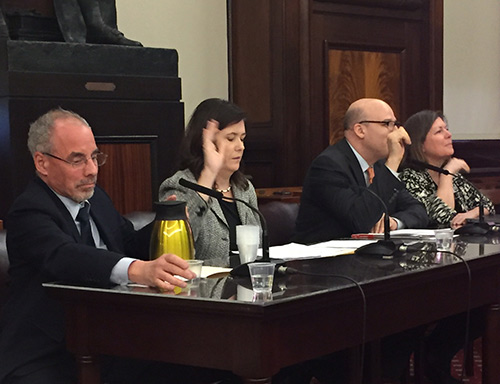TC’s Kelly Parkes Testifies Before NYC Council Committee

Parkes noted that TC has approximately 30 teacher preparation programs. “We prepare teachers in all the content areas, as well as early childhood, elementary, bilingual teachers, and specialists. We are deeply invested in preparing teachers for the demands of the profession.”
Parkes offered feedback to the City Council on some other initiatives of the Department of Education, including:
- TC graduates take multiple exams – the ALST, the EAS, a CST, and the edTPA – at a cumulative cost of approximately $800 for each student – in order to become certified teachers. “These costs are prohibitive,” while “research evidence suggests that not one of these tests have strong predictive validity for teaching effectiveness or quality.” This requirement should be lessened or removed, but if that isn’t possible, then we should “consider increasing support for teacher preparation programs to help students take these exams.”
- The State should continue supporting initiatives such as the Teacher Opportunity Corps, which enable programs such as the ‘My Brother’s Keeper’ program, to help many new teachers of color find and keep teaching positions New York City schools.
- Requiring applicants to teacher preparation programs to take the Graduate Record Exam (GRE) is problematic. The GRE requirement does not raise the quality of teachers applying to programs; it “does not accurately assess a test-taker’s full potential for university level achievement, let alone teaching”; and “limits access to graduate schools for many individuals, especially women, students of color and other minority group applicants.” It essentially discourages “many potential teachers from even applying. We want to diversify our student body, which will also increase our teaching workforce diversity.”
- Teacher evaluation initiatives, including decreasing the importance of student test scores in evaluating teachers, are encouraging. The use of “multiple measures in teacher evaluation is strongly supported in research, and we highly recommend more contextual, formative, and relevant paths of teacher evaluation be explored and implemented in order to promote professional development and retention in the workforce.”
“We would like you to consider private colleges like ours, alongside CUNY and SUNY, as key partners and valuable assets in the preparation of teachers to be recruited and retained to teach in New York City schools,” Parkes said. “This partnership and dialogue will ensure that our teachers are ready and successful.”
Published Thursday, Feb 2, 2017